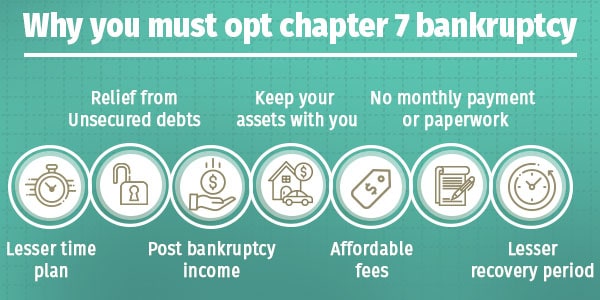If you see bankruptcy filing as the one and only way out of your debt dilemma, and if you are sure of doing it, the very next question that pops up is under which bankruptcy to file. For most people who are looking to file personal bankruptcy, the choice entirely ceases down to either Chapter 7 or Chapter 13 bankruptcy. So the question is - which one is better and preferable? To me, Chapter 7 bankruptcy is always preferable than Chapter 13 as of some of the undeniable advantages it carry over Chapter 13. Some bankruptcy attorneys might not agree with me but I think Chapter 7 undoubtedly overpowers Chapter 13 by all means. So let’s peep into the benefits one filer might avail by filing Chapter 7.
1) Chapter 7 bankruptcy term is relatively shorter
As per federal law, it takes about 4-6 months for the entire Chapter 7 bankruptcy process. This might seem a lengthy period, but it’s actually a very shorter time in the legal world and moreover, if you compare to Chapter 13 filing, which takes around 3-5 years to complete, it’s just a fraction of the time.
2) Unsecured debts are completely discharged
Technically, debts are broken down into two groups - secured debts (i.e. mortgage, car loans, anything with collateral) and unsecured debts (i.e. credit card bills, medical bills, personal loans). However, there is also a sub-category of unsecured debts where stuffs like student loans and taxes fall. If you file for Chapter 7, all your unsecured debts (except certain like student loans, taxes, child alimony) are completely discharged unlike Chapter 13 bankruptcy.
3) Your post Chapter 7 bankruptcy income is completely yours
Unlike Chapter 13 bankruptcy, the income that you receive after filing for Chapter 7 is not a part of the bankruptcy estate. Though there are few exceptions such as fortune you receive as inheritance within 6 months after your petition is filed, usually you keep what you earn.
4) You usually keep your assets
Some people prefer Chapter 13 bankruptcy as it allows debtors to retain their assets unlike Chapter 7 where there is a liquidation process involved. But if we take a look at the US bankruptcy filing statistics, we would find most of the Chapter 7 filers seldom lose an asset due to liquidation as of the loophole or privilege named ‘exemption’ set by the Bankruptcy Code. In most of the US states, the list of exempt property in a Chapter 7 case is pretty good.
You can save your social security disability insurance from bankruptcy under the new bill, Return to Work Act of 2019. It can help a person to return to work, if they can, while preserving the program's long-term sustainability for the permanently disabled.
5) The legal fees are affordable
As Chapter 7 bankruptcy lasts for just 4-6 months, the legal expenses that you make are much less if compared to what is required for Chapter 13 filing.
6) No monthly payment or paperwork
Unlike Chapter 13, no monthly payment or paperwork is required in Chapter 7 bankruptcy as most of the debts are discharged. Moreover, as your future income isn’t a part of the bankruptcy process, there are no monthly reports that you need to submit.
7) Post-bankruptcy recovery period is relatively less
Filing Chapter 7 bankruptcy undoubtedly hurts your credit score. But many people found their credit score increased dramatically after 12 months of the discharge. Moreover, if you maintain a good payment history after the filing is complete, you can be qualify for an FHA home loan.
Some filers won't be able to qualify for Chapter 7 bankruptcy as of their income that exceeds the state median income. However, I always recommend to try Chapter 7 if it's possible.









